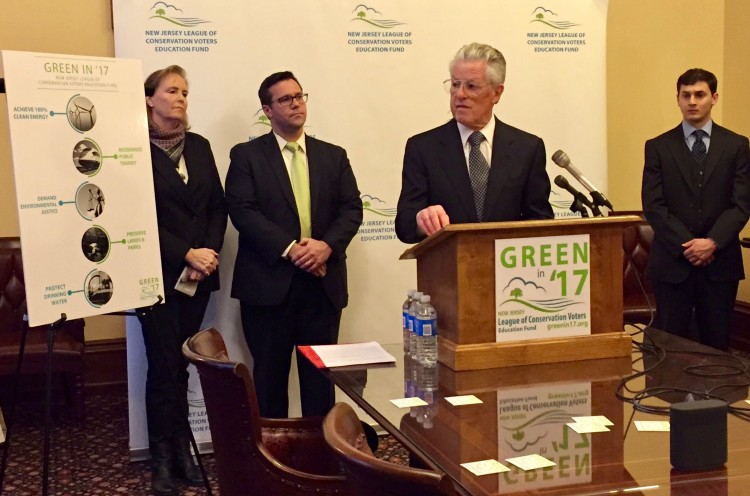
With this year’s governor’s race rounding into shape, add the League of Conservation Voters to the roster of groups launching efforts to get the candidates’ attention and steer the debate.
The LCV’s education fund announced Tuesday, at a Statehouse event that featured former Govs. Jim Florio and Christie Whitman, that it will spend $750,000 on a campaign aiming to put climate change, public transportation, drinking water, urban industrialization and land preservation on the agenda.
On climate change, the campaign seeks a commitment for New Jersey to get all of its energy from renewable sources by 2050.
“I think New Jersey would be one of the first states to set that as an objective,” said fund executive director Ed Potosnak. “I think Hawaii beat us to it. But certainly we have been a leader in the past, and there’s no reason to think we can’t be a leader again.”
Whitman, who took part in the event by phone, listed climate change among the issues New Jersey’s next governor needs to address.
“With 127 miles of beaches, New Jersey is probably as vulnerable as any state, save Alaska, to climate change,” Whitman said.
“That’s the canary in the coal mine,” she said of Alaska. “What we see happening up there, with the loss of the ice sheet and the permafrost, what it’s doing to displace Native Alaskans up there, that’s something that could happen to us.”
Whitman said the governor can help New Jersey prepare by getting involved with where and how development will be allowed.
“We have got to recognize that a Superstorm Sandy is going to come again,” Whitman said. “It’s not like a one-off. This is part of what’s happening as the climate changes. However you want to describe that and however you want to assign blame for changing climate, it is occurring. And we are going to see more and more of these storms.”
In a poll conducted last September and October for the group ReThink Energy NJ, Fairleigh Dickinson University found two-thirds of registered voters favor reaching 80 percent renewable energy by 2050, with one-fifth opposed. The poll didn’t ask about 100 percent renewable energy.
Tom Gilbert, ReThink Energy NJ’s campaign director, said environmentalists approach the incoming administration of President-elect Donald Trump with trepidation – a point made frequently at the LCV event Tuesday.
“I think the one lesson that we know for sure is that the leadership on clean energy is going to have to come from the states,” Gilbert said.
Florio said state-led environmental efforts will be particularly important during the Trump era.
“The very thought that they’re putting people in charge of EPA who don’t believe in EPA. They’re putting someone in charge of the Energy Department who wants to get rid of the Energy Department,” Florio said. “That’s just so bizarre, but it really also indicates the importance of state activity to pick up some of the slack if we can do that.”
Whitman headed the Environmental Protection Agency from 2001 and 2003 and said she’s concerned.
“I’m very troubled because of all the various issues that the president-elect has brought up and then sort of changed where his thinking is, this is not one,” Whitman said. “He does seem to be committed to the proposition that the Environmental Protection Agency is unnecessary, that every regulation that is put in place is just designed to inhibit business. And we are going to pay a terrible price for that if it goes forward.”
“You could say on the one hand it’s great to put skeptics in charge of these various departments and agencies because, it’s true, government grows over time, and there are programs that aren’t as critical any more that probably could be phased out. And certainly with EPA there are regulations that should be rethought,” Whitman said. “But to undermine the science behind them, to denigrate the mission of the agency, those things are enormously troubling.”
Florio said it appears the Trump administration will be “particularly sensitive to public opinion” – providing a chance for the public to have influence, he said.
“There’s not an ideological thrust. There’s really a pragmatic, opportunistic thrust coming out of this administration. To the degree the public weighs in, that can be determinative of policy,” Florio said.
Potosnak said New Jersey residents can similarly influence the priorities of the next governor.
“If people speak about the environment and their desire for healthy air, clean water and clean jobs, candidates will follow,” he said.